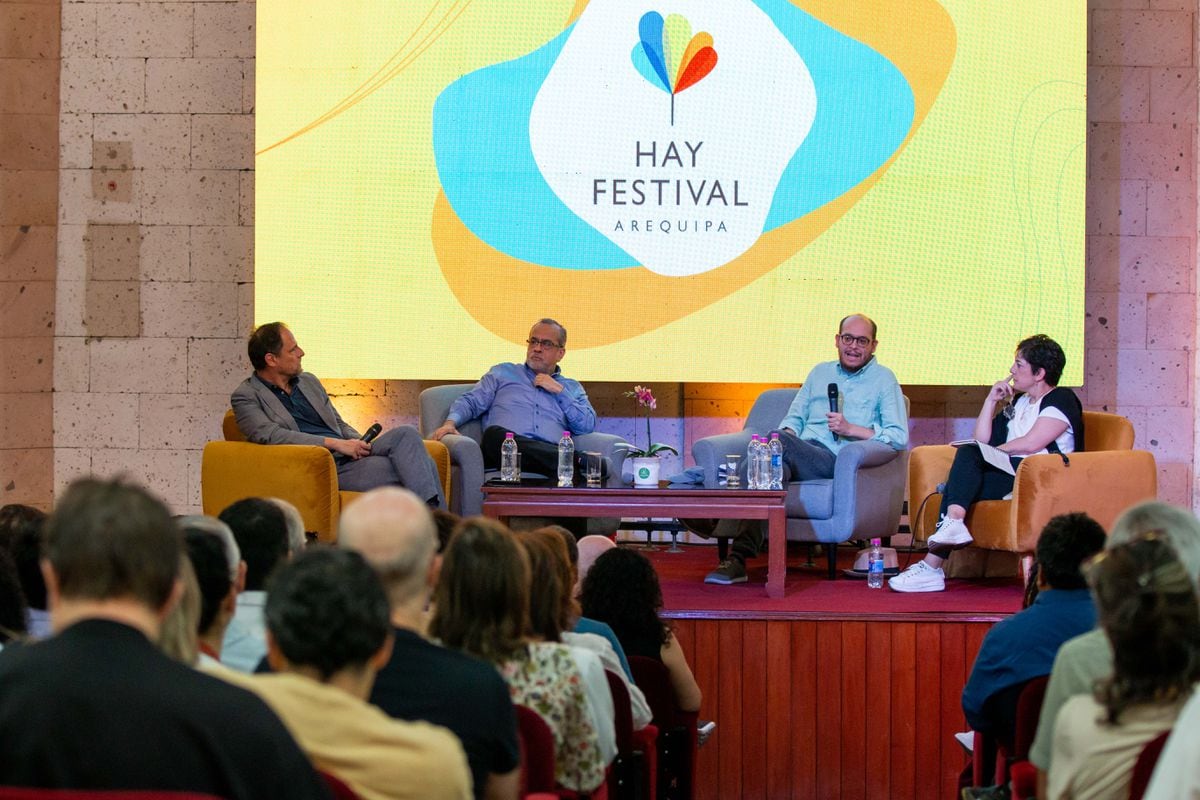A deep immobile continent where its inhabitants are trapped between sticky floors and roofs with a perverse effect: it prevents the poor from climbing and the rich are kept from being poor. Peruvian political scientist Alberto Vergara captures this theory of damaged edifice in his latest editorial installment, Deceived republics. Can Latin America escape its traffic jams? The book served as the starting point for one of the most popular events, the Hay Festival Arequipa 2023, fueling high expectations.
Added to Vergara’s academic perspective was the deep knowledge of the region by Jan Martínez Ahrens, director of EL PAÍS America, and the mastery of the education sector by economist Jaime Saavedra, former Peruvian Minister of Education for two presidential terms. The table was streamlined with journalist and linguist Patricia Del Rio very active participation in the discussion in the Bar Association Auditorium of Arequipa, a vibrant city of Arequipa for four days with a hundred national and international guests.
Vergara says the Republican promise, regardless of the political colors of the government in power, is being falsified daily. Social outbursts, protest votes at the polls, and unrest at the polls are all reflections of a larger crisis of legitimacy. “People are aware of this lack of freedom. Your effort or talent will not allow you to save yourself from your design. Only 0.5% of those born in the poorest quintile can go to the rich. “Crime is the mechanism of social progress in contemporary Latin America,” explains Alberto Vergara.
John Martinez Ahrens, for his part, emphasized that political change does not guarantee that Latinos’ structural problems will be solved. “Governments change, elections are held, but citizens feel that problems are recurring. Change is a necessary condition, but not sufficient. The citizen votes but once voted he has no influence. That is what Latin America is missing: a democratic performance that does not yet exist,” he describes.
Education is an important issue in most regions, but especially in Peru, where only 50% of children who finish primary school understand what they are reading. In 2011, the percentage was worse: only 20%. Despite the reduction, the matter is still a concern. “Education allows us to be independent. Without education you are going to do what you can, not what you want. We are in a very unequal country, with teachers who lack the minimum skills to provide children with basic skills such as reading comprehension. Without that competition they won’t catch up to others in their training process,” says Jaime Saavetra, a defender of a strong state that regulates the private sector.
The economist who led education reform in Peru and who has trod the halls of Congress several times also refers to the loophole created during the pandemic, due to the government’s decision to close schools to avoid contagion. There is no evidence. “In Latin America and South Asia, unacceptable schools have been closed for two years. They are missing school for two years of adolescence or childhood. It has disappeared as an element of social cohesion,” says the Minister of Education in the governments of Ollanda Humala and Pedro Pablo Kuczynski.
In his view, Jan Martínez Ahrens says that while there are consistent principles in the region, the ideals and interests are very different from one country to another. The lack of a collective vision is, in their view, the critical point. “Despite the fact that many countries in Europe have different historical trajectories and speak different languages, there is a much stronger union of values than in Latin America. The European Union embodies the basic values of cooperation and solidarity. The United States is missing a target. Latin American countries, which create traction and often have common elements in their Something that confirms that domestic problems can be overcome. The United States may have done it, but the United States does not share values, it imposes them,” says the director of EL PAÍS America.
In the last part of the event, Alberto Vergara raised the alarm about Peruvian politics and its democratic decay. “If we do not recognize in Peru the process of removing the mechanisms that allow for civilized coexistence, such as democracy and the rule of law, the more time passes to engage in it, the more we will have to do. We cannot believe that democracy is an artefact that can live without the will of its citizens. A poor country like ours. Citizen. So commitment should be demanded from the top,” he said.
The ninth edition of the Hay Festival in Arequipa has recorded 26,000 in-person attendees and 44,000 digital views to date. “Collective reflection, searching for new paradigms on topics such as democracy, environmental care and new ways of thinking in cities, through literature and journalism is the most important part of this edition. It gives us a lot of meaning and energy to prepare for the tenth celebration,” said Cristina Fuentes Law, International Director of the Hay Festival. Roche says confidently.


:quality(85)/cloudfront-us-east-1.images.arcpublishing.com/infobae/BH6NLAQGXJGADFWTENBUV7Z7RQ.jpg)
:quality(85)/cloudfront-us-east-1.images.arcpublishing.com/infobae/3GK63ATFOMFAYNUAQKUL4WUJFM.jpg)

:quality(85)/cloudfront-us-east-1.images.arcpublishing.com/infobae/SJ35ZLSJ5NB4BWVRJPSK74P7AQ.jpg)